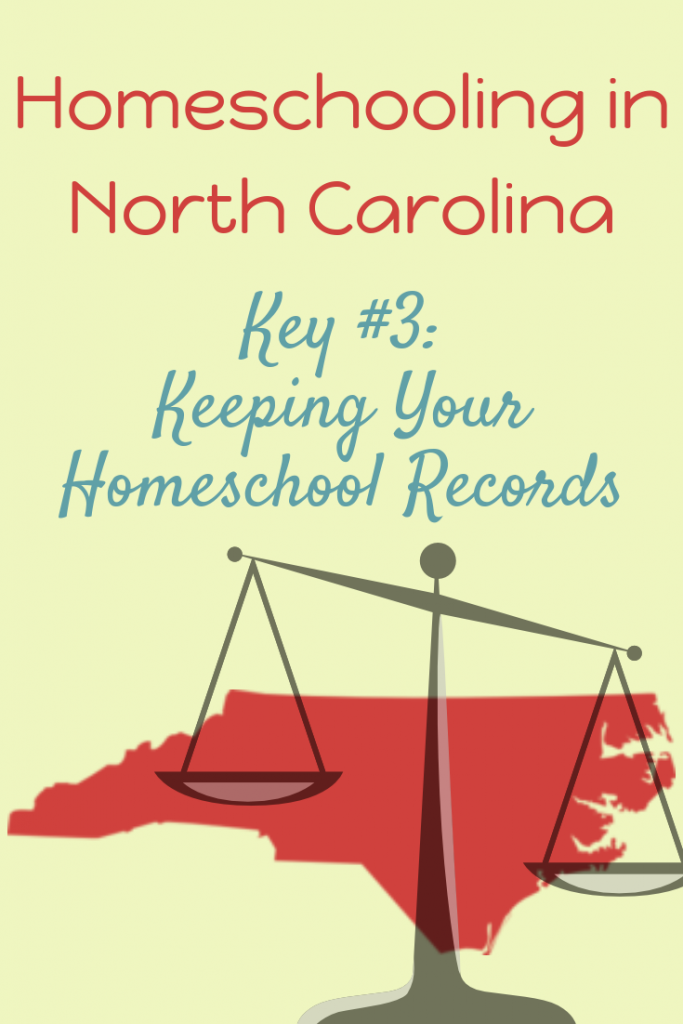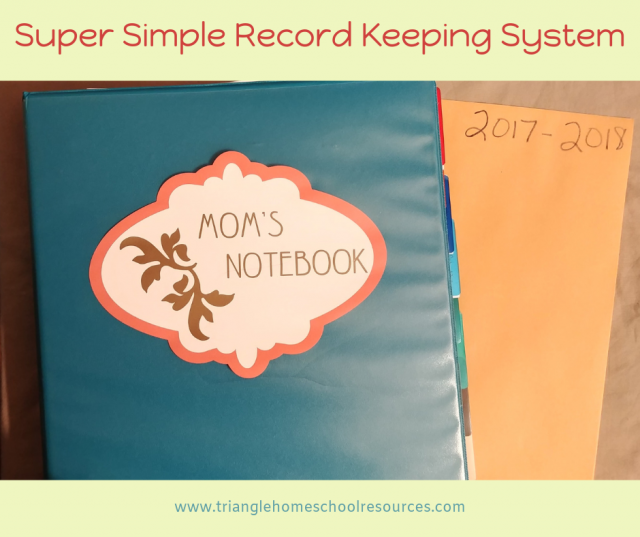Your homeschool records might include a treasure-trove of artwork, heartfelt stories, and pages of math practice, but legally, none of that meets requirements according to the State of North Carolina. In this article (part 4 of a 4-part series on keeping your homeschool legal in NC), I’ll show you exactly what you DO need and my super-simple method of keeping records.

Key #3 to legal homeschooling in North Carolina is keeping the right homeschool records!
If you’re overwhelmed with how much paper seems to be involved with homeschooling your children… Well, actually, I can’t help you much with that. After 10 years, I’m still figuring out the organization of daily work. But I CAN help you keep your legal records streamlined and simple!
When my family started homeschooling, we lived in Pennsylvania. If you want to see a state that can make record-keeping scary, take a look at PA’s portfolio requirements. Luckily, my children weren’t compulsory age yet, so I hadn’t actually had to keep anything. But the specter of that paperwork gave me nightmares!
By comparison, keeping homeschool records in North Carolina is a breeze!
Before continuing, please understand that the Triangle Homeschool Resource Center is not an organization engaged in providing professional legal advice and cannot be held responsible for misinformation or misinterpretation of information found here. For more, please see our Terms and Conditions.
What you need to keep
Y’all aren’t going to believe how easy this is! Are you ready?
You need:
That’s it! Don’t believe me? Read it for yourself on the Division of Non-Public Education’s website (DNPE). To be honest, though, it does take a thorough reading of most pages to find the places where it refers to what you need to keep on hand. But I HIGHLY RECOMMEND reading everything you find and that site. And then reading it again. Often.
While the 3 records listed above are what DNPE says it requires, there is some fine print that leads me to recommend a few extra record-keeping tasks. We’ll get to those at the end, and I’ll tell you what you don’t need, and how to store what you have.
Let’s look at each requirement in a little more detail.
1. Immunization
Immunization or exemption from immunization records in accordance with requirements for ALL schools in North Carolina must be kept on file.
For specifics on immunizations, you can check out the details at NC.gov.
In terms of how to keep that record, you can ask your child’s doctor for a print-out of vaccine history. You keep either this printout, or your exemption, with your current year’s records and update it as needed.
2. Attendance
Ok, go ahead and ask the obvious question: You have to record when your child is present at home? Yes. Yes, you do. *wink*
All kidding aside, I really don’t think this is what the state has in mind with this requirement. Since we are to be home educating on a regular schedule for at least 9 months of the year, I believe this is what we are to be recording.
Keeping in mind that there are no requirements for how we teach, or how our children learn, many families (mine included) consider that daily life is chock full of educational moments. These count as school days if you want them to. If it benefits your educational style to keep track of more structured school days, you can do that too. The fact is, there is no legal definition of what has to be in that attendance record, so make it meaningful for you.
To make keeping this record easy, DNPE provides a handy printable. Print one and check off days as you go.
3. Standardized testing
We covered standardized testing in depth in post #3. For the purpose of records, print your child’s test results, or some proof of completion of the test, and file it away for at least a year.
It is recommended to retain test scores longer in case a child needs to be placed back into a traditional school. I’m not sure all schools accept the standardized test scoring for placement anyway, but it couldn’t hurt if you think they may be placing your child incorrectly.
Some extra record keeping tips
- You MUST keep your residential address up to date with DNPE. To inform them of a change of address, log in to your DNPE portal and update as needed.
- Keep verification of your homeschool registration (confirmation you filed your NOI) handy. I recommend printing and laminating. It’s not my favorite thing to carry around to get educator discounts, but it works. Mostly, though, it just stays at home with my records. You can also print one at the portal linked above.
- You can update your children’s ages in your DNPE record as you progress. This is not a legal requirement but is recommended. This is most necessary when you have a 14-year-old itching to get into Driver’s Ed.
What you don’t need
The following are recommendations from either the state or, perhaps, your fellow homeschoolers, but none of the following records are required:
- Grades and GPAs
- Lesson plans
- Log books and Journals
- Portfolios of completed work
Now, if you have a high schooler planning for a secondary education, colleges may frown on a lack of grades on a transcript. So you need to judge for yourself what additional recording you want to do of your children’s education. But lesson plans and a final exam for your 2nd grader to explore the Middle Ages? Don’t sweat it!
Storing your records

Let me share with you how I store my homeschool records.
I use a binder as my “control center.” I keep notes for myself, printables, masters of blank weekly schedules, goals worksheets, book lists… really, everything goes in this binder.
In a front pocket, I have my current year’s homeschool records:
- My laminated homeschool registration card
- A copy of the attendance sheet provided by DNPE (I leave the student’s name blank)
- A current vaccine record for each child
At the end of the school year, I photocopy the completed attendance sheet and put each student’s name on a copy and sign them.
I label a manila envelope with the completed school year, and into that envelope, I place the completed year’s records:
- One attendance sheet per child
- Certificate of Completion or score sheet from standardized tests for each student
I keep all the manila envelopes in a drawer in my desk in our homeschool space.
And that’s it, folks! Keeping your homeschool’s records in North Carolina is that easy.
About homeschool inspections
There are references in the homeschool law to inspections of homeschool records. This is not something to worry about! Sometime in your homeschooling career, probably within the first 3 to 5 years, you will receive a letter or an email from the Division of Non-Public Education asking if you’d like to submit to a voluntary inspection of your homeschool records. It is VOLUNTARY. You may participate if you wish, usually by mail, or by meeting with a DNPE representative at a local public library, but you are not required to assent.
If such a summons is confusing or scary, please contact me, and I would be glad to talk you through it!
I hope this series about the 3 Keys to Legal Homeschooling in North Carolina has been helpful to you!
If you would like to follow along as I add more information to help you navigate all of the resources for homeschooling in the Raleigh-Durham area, please subscribe to my email list below!
Previous: Key #2: Administer Annual Standardized Testing
First: 3 Keys to Following North Carolina Homeschool Law



I love your site! Thank you so much for the encouragement and the great tools to make our job easier.
Thank you so much for your kind comment!